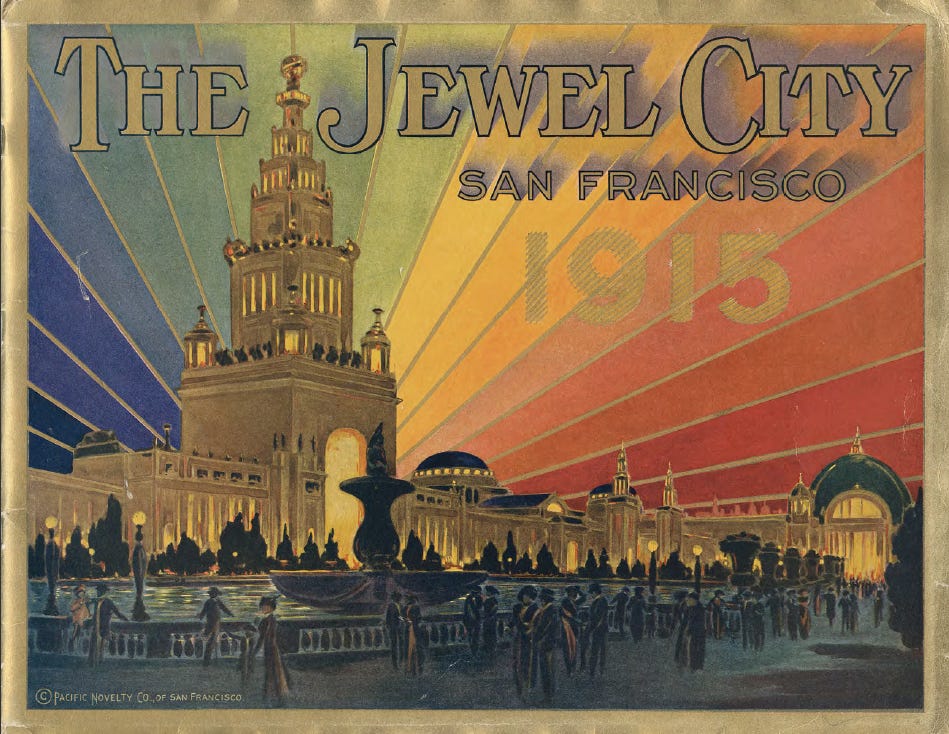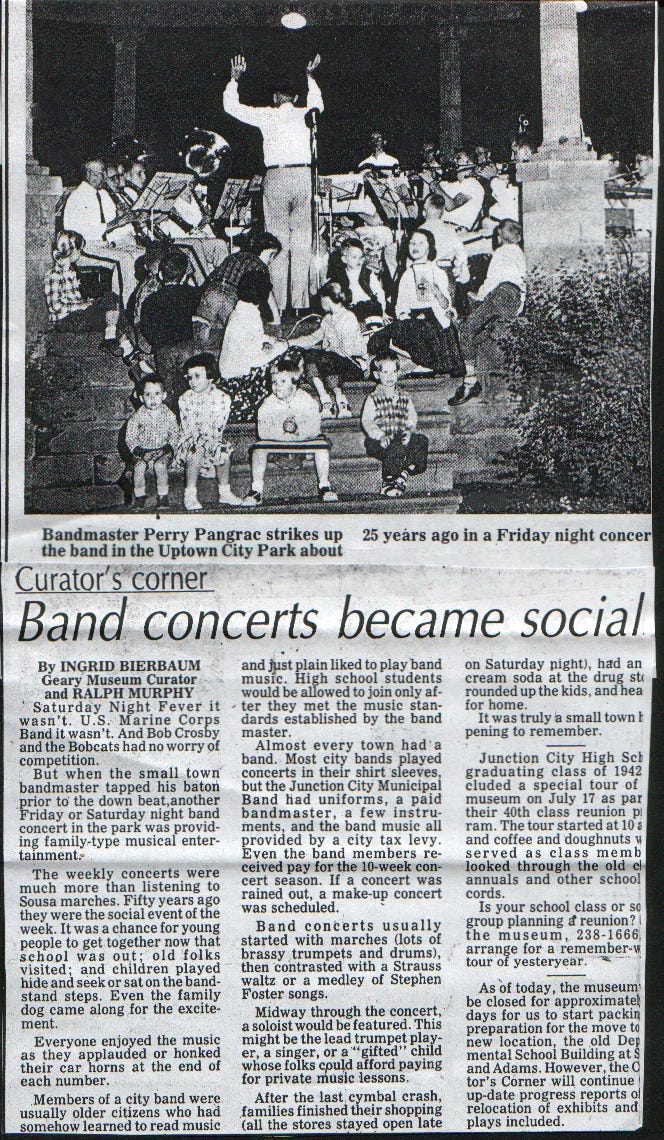There's No Place Like Home . . .
#133: Then & Now (Grandpa, War, & Intl. Expos), Lynch/Oz, Twin Peaks, part 8, Chris Pappan, Cian Dayrit, Hugo Awards Scandal, Kristin Posehn, Mastodons, Tuba Skinny, and Imad Fares
THEN & NOW
In my last issue, I mentioned watching the film, Lynch/Oz (See also the Twin Peaks, part 8/Wizard of Oz clip at the end of this section). When LindaLay commented about the film in Issue #131, I realized that I wasn’t done with that topic, which brings me back to my grandfather.
Lolo (grandpa) Ignacio was nicknamed Iggy. He and his brother (on my mother’s side) both played clarinet. I know nothing about Lolo Iggy’s brother, my granduncle. I don’t even know his name. But I know that their careers as musicians were intertwined with the Philippine-American colonial war, the military, and music.
After the Americans “won” the war—that is, after the Filipinos had declared their victory over the Spanish and the US offered to “help out” but then changed their minds and instead colonized the country, which of course enraged the Filipinos, who resisted and then lost—Lolo Iggy joined the U.S. Cavalry. Jobs were hard to come by, then. But he was a talented musician, and was able to join the Philippine Constabulary band, led by a Black man, Lieutenant Walter H. Loving.
Thus, while the Philippines was struggling to deal with thousands dead, the loss of farm animals and crops, and the surrender of weapons and insurgents to the oversight of the US, my grandfather was able to travel the globe, playing at international expositions, whose fanciful but temporary towers, halls, and palaces were designed to be both awe-inspiring icons of Western culture, as well as celebrations of American technology and the utopia that was surely our future. These expositions were built at the height of the United States’ first flush of colonial power. Clearly, it was a thrilling time for American boosters, although both Mark Twain and Ida B. Wells had different ideas.
I imagine the two young brothers entering the fairgrounds for the first time and confronting these rather overblown spectacles of modern civilization. The buildings in these architectural fantasies looked not unlike the towers of Oz, the Emerald City, described in L. Frank Baum’s books—something like the Panama-Pacific Exposition’s “Jewel City”:

What was it like for those Filipino musicians to perform in the expositions? Were they awed, intimidated, hypnotized? Was it exhausting, thrilling, or both? Some indigenous Filipinos “performed” their cultures in special reservations on the premises. Did the Philippine Constabulary musicians feel like exotic curiosities on display?
My grandfather’s first home in Juban, Sorsogon might be described as a tropical paradise. Emerald green forests, sparkling lakes, and sandy beaches; graceful old Spanish Colonial houses that are still celebrated in the town’s history; in the distance, Mt. Bulusan towers over the palm trees and rice fields. The same can be said of Iba, where his wife and family lived in Zambales province; it even has its own volcano, Mt. Pinatubo.
Yet, one day, he left his family and migrated straight to—of all places (apologies to Midwestern residents)—Kansas. I’ve hinted previously that part of the problem was that at least two women (one in Juban, and another—my grandmother—in Iba), were righteously angry with him.
What story or myth could be so strong as to lure someone to the flatlands and wheat fields of Kansas? Perhaps the United States still somehow seemed like “a country in which magical things happen” (Michael O’Neal Riley, 531). Perhaps Lolo Iggy had an army job at Fort Riley. Perhaps he was relieved to leave one set of problems, and start over again in a different country. Shortly after he arrived in Kansas, he met a young white woman and made his home in Junction City, a town on the prairie.
In the early 2000s, I went on a road trip to Kansas and met my Aunt Patricia, who was a wonderful woman, eager to share information about the “Kansas” Groyons. She told me that her mother was excluded from her own family for taking up with a Filipino man.
They lived in a house that looked a little like Auntie Em’s farmhouse in The Wonderful Wizard of Oz. At least, that was how it appeared to me when I looked up Lolo’s old Junction City address on Google Maps. I wonder if he ever found his utopia, his “home,” or if he carried his own nightmare with him. Likely, as an immigrant to the US, he struggled with his past and his present, like we all do. Perhaps he found solace in music. He died in 1957. I never met him, and he never visited us on the West Coast, although he responded twice to two letters written to him by my mother.

"'[back] From the Land of Oz,' said Dorothy gravely. 'And here is Toto, too. And oh, Aunt Em! I'm so glad to be at home again!'" —Last line from The Wonderful Wizard of Oz, L. Frank Baum.

In the Lynch/Oz film, various filmmakers and critics talk about Lynch’s apparent obsession with Oz. He actually says “there is not a day that goes by that I don’t think about The Wizard of Oz.” I remember, as a kid, closing the covers on the last page in the last book of the series, and feeling, for the first time, that sadness one feels upon “waking” from reading a book series—where little girls can have daring adventures and travel to magic lands—and having to return to the “real” world.
But the tension between the promised utopia of Oz and the real world of war and betrayal is so extreme in Lynch’s films that it’s expressed as a nightmarish disorientation, a mysterious space opening up in which the worst can happen.
Here is a short clip (from the fatecolossal channel) juxtaposing Twin Peaks Part 8 x The Wizard of Oz.2 CW: Since part of this is a creation of David Lynch, there will be some disturbing moments:
RABBIT HOLE
Interview with “Chris Pappan On Connecting to His Ancestors, Stereotypes, and the Center for Native Futures.” Pappan is a citizen of the Kaw (Kanza) Nation from Kansas, and of Osage, Lakota, and European descent. Video: Pappan discusses ledger art:
Interview with collaborative artist, embroiderer, and cartographer Cian Dayrit. He examines and subverts objects of power. See also “Motions of This Kind 2019 London”:
I wanted to challenge the perspectives that somehow monopolised the framing of history and heritage’—Cian Dayrit
A few months ago, I mentioned that I’d been reading R. F. Kuang’s excellent novel, Babel: Or the Necessity of Violence: An Arcane History of the Oxford Translators' Revolution, and I really enjoyed it. I just learned that it had been nominated for a Hugo award—but a very weird thing happened at the Hugo Awards this year. Read all about “The Censorship Scandal That Rocked Sci-Fi and Fantasy's Biggest Awards” by Adam Morgan in Esquire.
In “A Study of the Heart,” Kristin Posehn writes about her grandfather and dreaming from the heart. From her Substack newsletter, The Pamplet.
Several Mastodons:
Note: if you want to visit the Mastodon server where one of these folks is located, just paste the two.words after the last @ in your browser, e.g., wandering.shop or mastodon.art. Click on “live feeds” or “local timeline” (top right) to see what the community is posting.
Artist, magician, and symbol enthusiast Helvetica Blanc: @helveticablanc@merveilles.town | Writer, artist, and photographer Colorblind Cowboy: @colorblindcowboy@mastodon.art | Artist Todd Anderson: @toddanderson@mstdn.social
SOUNDINGS
Back on the streets, with:
Tuba Skinny,3 in New Orleans with Shaye Cohn on cornet, performing Jubilee Stomp – Royal Street I, on TheWsm channel (check out the couple dancing off into the night):
and . . .
Imad Fares’ Rhumba Flamenco—and the dancing kid—eventually gets people moving on a cold night.
Thanks for reading/listening to Eulipion Outpost. Special thanks to my supporters for paid subscriptions to this newsletter and donations to my Ko-fi. Free and paid subscriptions are both available. If you haven’t already, please subscribe!
I’d also like to thank my wonderful partner, M., for his unwavering support and late-night edits to this newsletter!
Check out my LinkTree to see my other sites all in one location.
Oz and Beyond: The Fantasy World of L. Frank Baum, by Michael O. Riley (1998).
“The Return, Part 8” of Twin Peaks was written by Mark Frost and David Lynch, directed by Lynch, and stars Kyle MacLachlan
Tuba Skinny: Shaye Cohn - Cornet, Todd Burdick- Tuba/Sousaphone, Robin Rapuzzi - Washboard, Jason Lawrence - Banjo, Max Bien Kahn - Guitar, Greg Sherman - Guitar, Barnabus Jones - Trombone, Ewan Bleach - Clarinet




